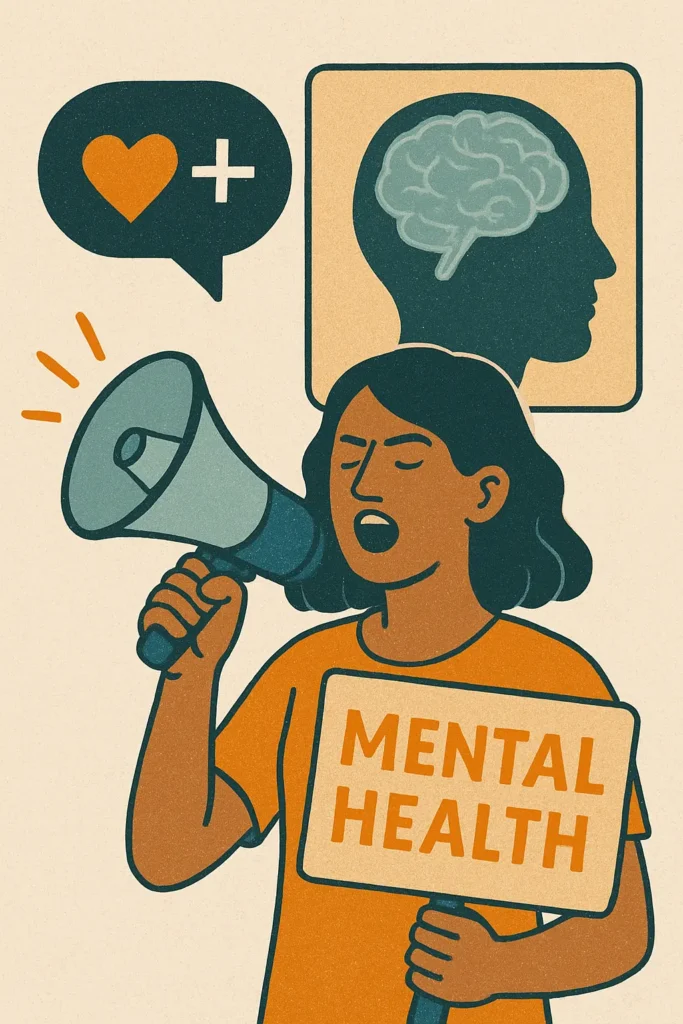Mental health advocacy has come a long way from the days when mental illness was hidden in shadows and whispered about in hushed tones. Today’s advocates are breaking down barriers, changing policies, and transforming how society understands and responds to mental health challenges. Yet significant work remains to create truly equitable and accessible mental health care for all.
The Evolution of Mental Health Advocacy
Mental health advocacy has evolved through several distinct phases:
Historical Awareness (1800s-1950s): Early advocates focused on improving conditions in psychiatric institutions and establishing basic human rights for people with mental illness.
Deinstitutionalization Movement (1960s-1980s): Advocates pushed for community-based care instead of long-term hospitalization, though implementation often fell short of ideals.
Consumer/Survivor Movement (1980s-2000s): People with lived experience began leading advocacy efforts, emphasizing self-determination and recovery-oriented approaches.
Integration and Prevention Era (2000s-present): Modern advocacy focuses on integrating mental health into primary care, reducing stigma, and preventing mental health problems before they develop.
Current Mental Health Advocacy Priorities
Today’s mental health advocates work on multiple fronts to create systemic change:
Policy and Legislation:
- Parity laws ensuring equal insurance coverage for mental and physical health
- Increased funding for community mental health services
- Criminal justice reform to address the criminalization of mental illness
- Workplace mental health protections and accommodations
Stigma Reduction:
- Public awareness campaigns that normalize conversations about mental health
- Media advocacy to improve representation of mental illness
- Educational programs in schools and communities
- Challenging discriminatory practices in employment and housing
Access and Quality:
- Expanding the mental health workforce, particularly in underserved areas
- Integrating mental health services into primary care settings
- Developing culturally responsive treatment approaches
- Improving crisis intervention and suicide prevention services
Youth and Prevention:
- School-based mental health programs and social-emotional learning
- Early intervention services for at-risk children and families
- Youth-led advocacy initiatives
- Addressing social determinants of mental health
The Power of Personal Stories in Advocacy
One of the most powerful tools in mental health advocacy is personal storytelling. When people share their experiences with mental health challenges, they:
- Humanize statistics and policy debates
- Reduce stigma by showing that mental illness affects people from all walks of life
- Inspire hope by demonstrating recovery and resilience
- Educate others about the realities of living with mental health conditions
- Motivate action by connecting abstract issues to human experiences
However, sharing personal stories requires careful consideration of privacy, safety, and ongoing impact on the storyteller’s life and relationships.
Effective Advocacy Strategies
Successful mental health advocacy combines multiple approaches:
Grassroots Organizing: Building coalitions of people directly affected by mental health issues, including individuals with lived experience, family members, and allied professionals.
Policy Advocacy: Working with legislators and government agencies to develop and implement policies that improve mental health systems and outcomes.
Media Advocacy: Using traditional and social media to shape public opinion and raise awareness about mental health issues.
Legal Advocacy: Challenging discriminatory practices and inadequate services through the court system.
Research and Data: Using evidence to support advocacy positions and demonstrate the need for change.
Corporate Engagement: Working with employers to implement workplace mental health programs and policies.
Challenges Facing Mental Health Advocates
Despite significant progress, mental health advocates continue to face substantial challenges:
Funding Limitations: Mental health services remain chronically underfunded compared to physical health services, limiting the scope of available programs and advocacy efforts.
Political Resistance: Mental health issues can become politicized, making it difficult to achieve bipartisan support for necessary changes.
System Complexity: The mental health system involves multiple agencies, funding streams, and stakeholders, making systemic change slow and complicated.
Competing Priorities: Mental health often competes with other pressing social issues for public attention and resources.
Burnout: Advocates, particularly those with lived experience, may experience burnout from the emotional toll of advocacy work combined with managing their own mental health.
The Role of Lived Experience in Advocacy
People with personal experience of mental health challenges bring unique perspectives and credibility to advocacy efforts. Their contributions include:
- Authentic voices that can speak to the real impacts of policies and services
- Insider knowledge of what works and what doesn’t in mental health treatment
- Moral authority that comes from direct experience with the issues being addressed
- Connection with others who have similar experiences
However, it’s crucial that lived experience advocates are supported, compensated fairly for their work, and not tokenized or expected to represent all people with mental health conditions.
Global Mental Health Advocacy
Mental health advocacy is increasingly becoming a global movement, with advocates working across borders to address shared challenges:
International Frameworks: The UN Convention on the Rights of Persons with Disabilities and WHO’s Mental Health Action Plan provide frameworks for global advocacy.
Cross-Cultural Learning: Advocates share strategies and learn from different approaches to mental health care around the world.
Technology and Connection: Digital platforms enable global collaboration and resource sharing among advocates.
Economic Arguments: Advocates increasingly use economic data to demonstrate the cost of untreated mental illness and the return on investment of mental health services.
Building the Next Generation of Mental Health Advocates
Sustaining momentum in mental health advocacy requires developing new leaders and advocates:
Youth Engagement: Young people are increasingly leading mental health advocacy efforts, bringing fresh perspectives and digital native skills.
Leadership Development: Training programs help develop advocacy skills among people with lived experience and allied supporters.
Intersectional Approaches: New advocates are addressing how mental health intersects with other social justice issues including racial justice, LGBTQ+ rights, and economic inequality.
Innovation: Emerging advocates are using new technologies and creative approaches to reach audiences and create change.
The Future of Mental Health Advocacy
Looking ahead, mental health advocacy will likely focus on:
- Prevention and early intervention rather than only crisis response
- Social determinants of mental health including housing, employment, and education
- Technology ethics ensuring that digital mental health tools are safe, effective, and equitable
- Climate and mental health addressing the mental health impacts of environmental changes
- Integrated approaches that address mental health alongside other health and social issues
Getting Involved in Mental Health Advocacy
Mental health advocacy needs diverse voices and skills. Ways to get involved include:
- Sharing your story (when safe and appropriate) to reduce stigma and educate others
- Contacting legislators about mental health policies and funding
- Supporting advocacy organizations through donations, volunteering, or membership
- Workplace advocacy by promoting mental health awareness and policies in your job
- Community education by speaking at schools, community groups, or faith organizations
- Social media advocacy by sharing accurate information and resources
Mental health advocacy is ultimately about creating a world where all people can access the support they need to thrive. This requires sustained effort from individuals, organizations, and communities working together toward common goals.
Every person who speaks up about mental health, challenges stigma, or works to improve services is contributing to this vital movement. The future of mental health depends on all of us becoming advocates in our own communities and spheres of influence.
References:
- National Alliance on Mental Illness. (2023). Mental health advocacy: A guide to getting involved. NAMI Publications.
- Substance Abuse and Mental Health Services Administration. (2023). Principles of peer support. SAMHSA Resources.
- World Health Organization. (2023). Mental health advocacy and policy development. WHO Press.


